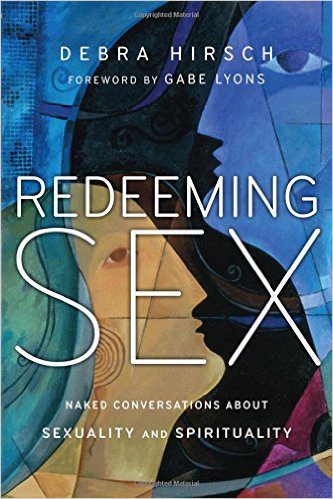One of the best books I read this year was Redeeming Sex by my friend Debra Hirsch – which may as well have added the subtitle From Harmful Evangelical Categories, because that’s exactly what the book accomplishes.
 It’s important to note from the outset that Deb’s book is written from within and, to some degree, to the evangelical community. In other words, there are biblical and theological assumptions and commitments that Deb brings to this work that other writers and thinkers may not be bringing. That’s not to say that she doesn’t represent a range of views and express real generosity toward diverse perspectives – she does – but it is to say that the telos of Redeeming Sex pertains to righting what has often gone so terribly wrong among evangelical Christians.
It’s important to note from the outset that Deb’s book is written from within and, to some degree, to the evangelical community. In other words, there are biblical and theological assumptions and commitments that Deb brings to this work that other writers and thinkers may not be bringing. That’s not to say that she doesn’t represent a range of views and express real generosity toward diverse perspectives – she does – but it is to say that the telos of Redeeming Sex pertains to righting what has often gone so terribly wrong among evangelical Christians.
But rest assured – this is not just another love the sinner, hate the sin tome in sheep’s clothing.
And the primary reason this is not that is Hirsch’s own story. As someone who has been in same-sex relationships and identified as lesbian as a younger adult, she approaches the subject with both firsthand experience and lived-out compassion. She counts LGBT people as friends and doesn’t apply simplistic theories and litmus tests to those friendships. Nor does she hold up her own experience – becoming a Christian and marrying a man – as a model for “conversion” to be emulated by all LGBT people. In her words:
We must lead with our embrace, not our theology. When we lead with our theology, we tend to get all caught up in the “wrongness” of some people’s behavior, and the humanness of the person is easily lost. (p. 145)
And:
These particular stories of those choosing to explore heterosexual relationships are clearly not everyone’s story. And they are only representative of some homosexually oriented individuals… The stories of individuals who have begun to pursue heterosexual sexual expression have, over time, been showcased and used as weapons in various political agendas, individual and organizational. (p. 127)
The first section of the book deals with sexuality writ large and establishes what many evangelicals seem content to ignore (if not outright deny) – that we are all fundamentally sexual beings. In fact, this fundamental sexuality is not limited to acts involving our genitals (genital sexuality) but instead extends to all of our relationships (social sexuality). The suppression of this reality in any context always leads to harmful expression towards self and others. And it denies what the Scripture itself condones as creationally good, and what Jesus himself demonstrated as God in the flesh.
I especially appreciated Deb’s assessment of the harmful categories and expressions rampant in evangelical culture and church history itself, at one point identifying one of my particular pet peeves: the smokin’ hot wife trend:
Even our attempts to positively integrate sexuality often seem out of kilter… Conferences help women be sexy for their men, with workshops on makeup, lingerie, how to develop vaginal muscles and so on. Husbands speak proudly and publicly about their “smoking hot” wives. I’m often left feeling both squeamish and offended! (p. 34)
The second section of the book deals particularly with LGBT sexuality, and perhaps makes its strongest arguments in Chapter 7. Here, Hirsch observes three possibilities for LGBT Christians who are not in denial about their sexual orientation but seek to genuinely live out their Christian faith in light of it. The New Normal Road, she says, pertains to those who choose to live in different-sex marriages despite same-sex attraction. The Celibate Road is, in keeping with “Side B” terminology, about living without genital-sexual relationships altogether (though social sexuality is expressed). But, perhaps most importantly, there is another road, what Hirsch calls the “Okay-With-Gay Road,” about which she writes:
People simply need people. And as difficult as some of these relationships might be for conservative evangelicals to accept, the question that needs to be dealt with here goes to the issue of how we can all be redeemed members of God’s family and yet disagree on occasion. Are the people who choose this path still brothers and sisters? Surely the answer must come from the claim to have the same Father in and through the saving work of Jesus. And that answer must be based on their confession and the work of God in their lives, just like the rest of us. Once again, it is worth saying here that all of us hobble into heaven and get there by grace. There is no room for self-righteousness and exclusion based on disputed interpretations on nonessential issues of the Bible. (pp. 130-131)
Validating all three of these possible ways of being gay and Christian in the world is perhaps the most vital step that evangelicals can make, despite any theological and ethical disagreements.
The final section of the book charts a way forward, beyond the old harmful evangelical categories, by homing in on a “welcoming but mutually transforming” (non?)policy and…Jesus-centeredness! While the mutual transformation language is somewhat difficult to pin down and simply won’t be clear enough for many people, perhaps especially LGBT people, Deb describes it thus: “Being welcoming and mutually transforming moves the issue from just being about LGBT people to being about all people” (p. 197).
But the much more compelling way forward has to do with Jesus-centeredness. In contrast with the “bounded set” of behavioral requirements that determine whether someone is in or out, Deb proposes the centered set of keeping Jesus clearly in view:
The centered set, on the other hand, has a “hard,” well-articulated and vibrant theological center, but tends to be “soft” at the edges. It assumes that every person is somewhere in relation to the center – in this case, Jesus… The primary concern of those operating within this type of thinking is to orient others toward the Center. In other words, focusing them toward an authentic encounter and understanding of God in Jesus Christ…
Rules must not be allowed to get in the way of the primary relationships with Jesus; this must come first. Making Jesus central is vital for the very spiritual life of the congregation (Revelation 1-3), but it has huge implications for our missional effectiveness as well. Besides, substituting the checking of boxes (doctrinal or moral) for active relationship with Jesus always leads toward a coercive and controlling religion. (pp. 192-193)
Of course, I’m all amen corner to these Jesus-centered sentiments, and I’ll end this review on that note.
I hope you pick up this book to get the full scope of Deb’s heart on these matters – and find yourself drawn closer to the Center in the process.
—












